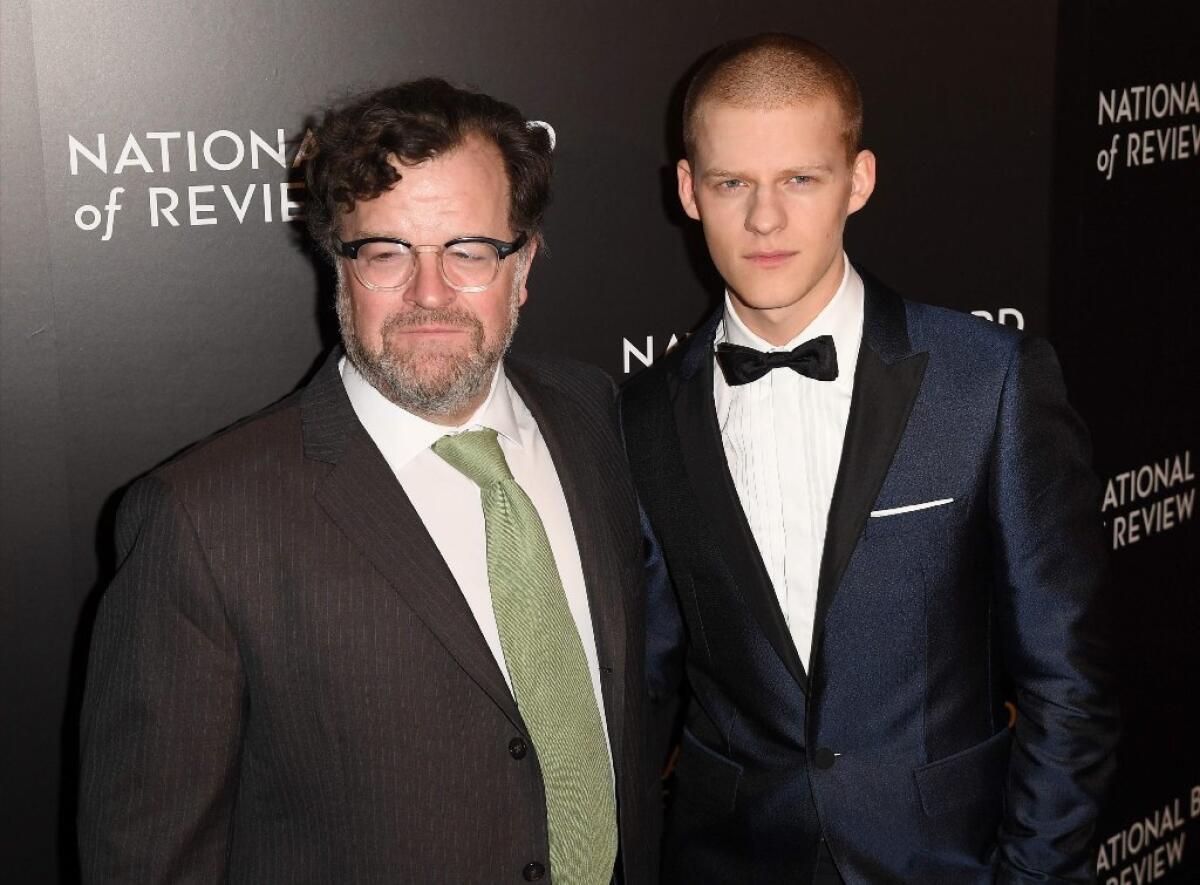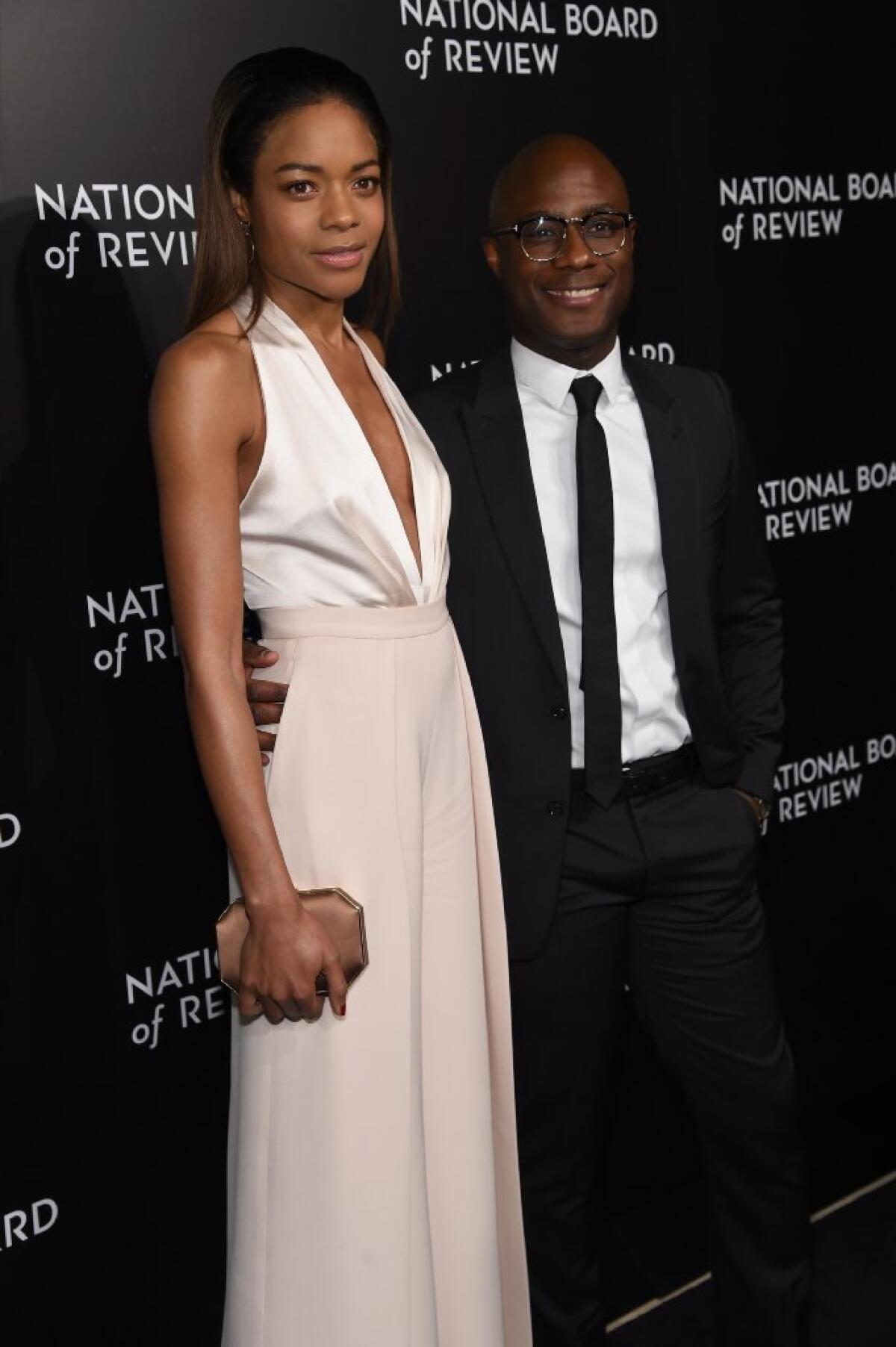‘Manchester,’ ‘Moonlight’ and politics dominated the National Board of Review gala

The National Board of Review ceremony isn’t the Golden Globes. And that can be a good thing.
The annual New York awards held its 2017 installment Wednesday night, offering up many of the seasonal contenders without many of the televisual restrictions. Speeches at the NBR gala tend to run long — sometimes, in the case of “Manchester by the Sea” breakout star Lucas Hedges and his leisurely ramble, insanely long — but they also are more relaxed and substantive than the canned thank-yous at bigger events.
“Manchester” director Kenneth Lonergan, who came to the stage repeatedly, to accept original screenplay and best film, was among the standouts, seeking to make meaningful points throughout the evening.
He offered a trenchant take on why he didn’t think “Manchester” was a downer — “It’s not about the sorrows a man is feeling but the effort he’s making to do the right thing” — and explained why he sometimes can seem less grateful than he feels. He then tilted a little shade at non-prestige filmmaking: “We in this room are trying to tell the truth. We’re not trying to exploit an interest.”
Ditto, on the substantive front, for Barry Jenkins, the “Moonlight” filmmaker who took the stage to receive best director after an introduction by Ta-Nehisi Coates. “We’re trying to make America great again. There was a time when a person like me wasn’t considered,” said Jenkins, who is black. “And I’m being considered. I’m going to take this honor as a symbol of making America great again.”
In presenting the award to Jenkins, Coates noted: “Barry, I know you didn’t set out to make a positive film. But in being productive you made the most positive film I’ve seen in quite some time.” (One more advantage to a not-televised event: People like Ta-Nehisi Coates can come to the podium.)

Race-themed ideas were a factor throughout the night. “Moonlight” star Naomie Harris, who won for supporting actress, said that the film’s lesson is that “there is an audience out there that wants to see communities that are often ignored in film.”
And “O.J.: Made in America” director Ezra Edelman, on accepting best documentary prize, said the inference he drew from his film’s popularity was that “people want the truth. They’re willing to stop and sit on the couch and learn something about their culture, about their country, about themselves.”
He also said that he’d asked Jeff Bridges, who earlier in the evening accepted the supporting actor prize by saluting protesters at Standing Rock, how the actor handles moments like this. His advice: He imagines it is the year 3010 and he’s just landed in the room.
The NBR isn’t necessarily seen as the most indicative of all award shows. Its approximately 100 members — a “select group of film enthusiasts, professionals, academics, and filmmakers of varying ages and backgrounds,” according to the website — share very little overlap with other voting groups. And its choice for top film, while often bold — “A Most Violent Year,” “Her,” “Mad Max: Fury Road” — rarely squares with the Academy Awards’ choice.
Still, the ceremony can offer a chance for favorites to hone their material. “Manchester” star Casey Affleck, who won for best actor, continued what has become his brand of slacker drollery on the circuit, knocking Lonergan for his perfectionism and obsessiveness.
“He’s always rewriting everything in his head and making me do [take after take] until I’m beaten down and discouraged. And then he says, ‘No, you did good, that’s OK.’ Look, he’s mopping his brow now,” Affleck said, gesturing to the director. “He’s already disgusted [with this speech].”
Comedy made its way into other appearances too: Greta Gerwig, introducing Hedges, noted a formative moment when she took the young actor to “The Crucible” on Broadway: “I felt like Richard Gere in ‘Pretty Woman’ taking Julia Roberts to the opera for the first time. Damn, does that prostitute love opera.”
And while “La La Land” was shut out for all awards — a rarity so far this season — Lonergan made a point of tipping his hat to it anyway in a refreshing break Wednesday night from the awards horse race (if not the world of politics).
“These are very troubled times. How troubled we don’t know,” Lonergan said, looking ahead to President-elect Donald Trump’s America. “But there are people in this room whose quality of work [gives us] the capacity to overcome obstacles.
“[My] film is about people who have a lot of trouble and have to struggle to do the right thing,” he continued. “It’s about truth — the approach Ezra [Edelman] takes and the approach Barry [Jenkins] takes. And ‘La La Land,’ which is another way to approach truth too — that emotion can override logic. Someone feels like singing and they sing. It’s another facet of the reality we’re trying to create and need to maintain as we try to weather these years.”
See the most-read stories in Entertainment this hour »
Twitter: @ZeitchikLAT
More to Read
Only good movies
Get the Indie Focus newsletter, Mark Olsen's weekly guide to the world of cinema.
You may occasionally receive promotional content from the Los Angeles Times.








